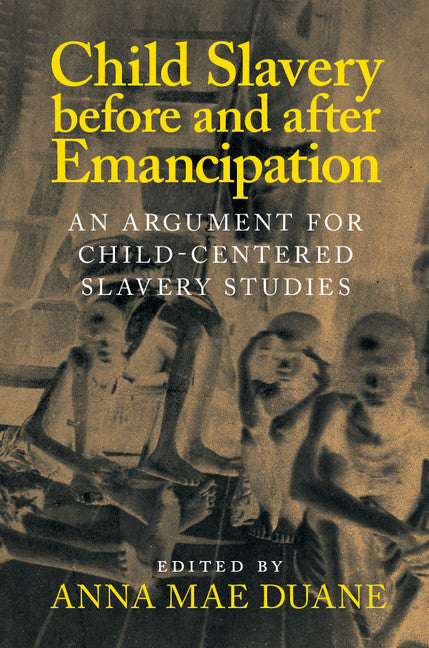Freshly Printed - allow 4 days lead
Couldn't load pickup availability
Child Slavery before and after Emancipation
An Argument for Child-Centered Slavery Studies
An innovative, interdisciplinary anthology arguing that we are unable to fully understand slavery - then and now - without attending to children's roles in slavery's machinations.
Anna Mae Duane (Edited by)
9781107566705, Cambridge University Press
Paperback / softback, published 21 February 2017
320 pages, 5 b/w illus. 1 table
22.8 x 15 x 1.8 cm, 0.49 kg
'This collection of 11 interdisciplinary essays combines case studies from the 19th century to the present, arguing that examining historical and modern child slavery together enriches and informs its history and vice versa. … This thought-provoking book advocates interdisciplinary, integrated research centering on global child slavery, attentive to children's voices and responsive to human rights.' N. Zmora, CHOICE
If we are to fully understand how slavery survived legal abolition, we must grapple with the work that abolition has left undone, and dismantle the structures that abolition has left in place. Child Slavery before and after Emancipation seeks to enable a vital conversation between historical and modern slavery studies - two fields that have traditionally run along parallel tracks rather than in relation to one another. In this collection, Anna Mae Duane and her interdisciplinary group of contributors seek to build historical and contemporary bridges between race-based chattel slavery and other forms of forced child labor, offering a series of case studies that illuminate the varied roles of enslaved children. Duane provides a provocative, historically grounded set of inquiries that suggest how attending to child slaves can help to better define both slavery and freedom.
Introduction: when is a child a slave? Anna Mae Duane
Part I: Introduction. The child as gift: the logic of the peculium in perpetuating logics of enslavement Anna Mae Duane
1. 'Remember, dear, when the Yankees came through here I was only ten years old': valuing the enslaved child of the WPA slave narratives Karen Sánchez-Eppler
2. The slave child as 'gift': involutions of proprietary and familial relations in the slaveholding household before emancipation Sarah Winter
Part II: Introduction. The public's claim to the private child: slaveries defined by a child's value Anna Mae Duane
3. The white slave: American girlhood, race, and memory at the turn of the century Micki McElya
4. Child's play: schools not jails Erica Meiners
5. Born free in the master's house: children and gradual emancipation in the early American North Sarah L. H. Gronningsater
Part III: Introduction. The child as a pivot point between consent and complicity Anna Mae Duane
6. Protecting the young and the innocent: age and consent in the enforcement of the White Slave Traffic Act Jessica R. Pliley
7. Slavery and the recruitment of child soldiers David M. Rosen
8. Notions of African childhood in abolitionist discourses: colonial and post-colonial humanitarianism in the fight against child slavery Audra A. Diptee
Part IV: Introduction. Children's voices, children's freedom Anna Mae Duane
9. 'If I got a chance to talk to the world': voice, agency, and claiming rights in narratives of contemporary child slavery Anna Mae Duane
10. Child domestic labor: 'when I play with the master's children, I must always let them win' Jonathan Blagbrough and Gary Craig
11. The global human rights of modern child slaves John Wall.
Subject Areas: Age groups: children [JFSP1], Black & Asian studies [JFSL3], Ethical issues & debates [JFM], Slavery & abolition of slavery [HBTS], National liberation & independence, post-colonialism [HBTR], Modern history to 20th century: c 1700 to c 1900 [HBLL], History of the Americas [HBJK]


